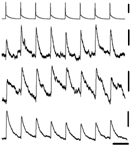TIME COGNITION: ENTANGLED NEURONAL FIRING
Finnerty, G. T. 19 Oct 2015 In : Current Biology. 25, 20, p. R994-R995
TIME IN CORTICAL CIRCUITS
Finnerty, G., Shadlen, M. N., Jazayeri, M., Nobre, A. C. & Buonomano, D. V. 14 Oct 2015 In : Journal of Neuroscience. 35, 41, p. 13912-13916
DELAYED AND TEMPORALLY IMPRECISE NEUROTRANSMISSION IN REORGANIZING CORTICAL MICROCIRCUITS
Barnes, S. J., Cheetham, C. E., Liu, Y., Bennett, S. H., Albieri, G., Jorstad, A. A., Knott, G. W. & Finnerty, G. T. 17 Jun 2015 In : Journal of Neuroscience. 35, 24, p. 9024-9037
RAPID BIDIRECTIONAL REORGANIZATION OF CORTICAL MICROCIRCUITS
Albieri, G., Barnes, S. J., de Celis Alonso, B., Cheetham, C. E. J., Edwards, C. E., Lowe, A. S., Karunaratne, H., Dear, J. P., Lee, K. C. & Finnerty, G. T. 2015 In : Cerebral cortex (New York, N.Y. : 1991). 25, 9, p. 3025-35
PANSYNAPTIC ENLARGEMENT AT ADULT CORTICAL CONNECTIONS STRENGTHENED BY EXPERIENCE
Cheetham, C. E. J., Barnes, S. J., Albieri, G., Knott, G. W. & Finnerty, G. T. Feb 2014 In : Cerebral Cortex. 24, 2, p. 521-531
NEOCORTICAL LEARNING, MEMORY AND EXPERIENCE-DEPENDENT PLASTICITY
Albieri, G. & Finnerty, G. T. Jul 2012 Memory Mechanisms in Health and Disease: Mechanistic Basis of Memory. Giese, K. P. (ed.). World Scientific, p. 213-234
EPILEPTIC HIGH-FREQUENCY NETWORK ACTIVITY IN A MODEL OF NON-LESIONAL TEMPORAL LOBE EPILEPSY
Jiruska, P., Finnerty, G. T., Powell, A. D., Lofti, N., Cmejla, R. & Jefferys, J. G. R. May 2010 In : Brain. 133, 5, p. 1380 - 1390
SENSORY EXPERIENCE AND CORTICAL REWIRING
Barnes, S. J. & Finnerty, G. T. Apr 2010 In : NEUROSCIENTIST. 16, 2, p. 186 - 198
ALTERED SENSORY EXPERIENCE INDUCES TARGETED REWIRING OF LOCAL EXCITATORY CONNECTIONS IN MATURE NEOCORTEX
Cheetham, C. E. J., Hammond, M. S. L., McFarlane, R. & Finnerty, G. T. 10 Sep 2008 In : Journal of Neuroscience. 28, 37, p. 9249 - 9260
SENSORY INPUTS FROM WHISKING MOVEMENTS MODIFY CORTICAL WHISKER MAPS VISUALIZED WITH FUNCTIONAL MAGNETIC RESONANCE IMAGING
Alonso, B. D. C., Lowe, A. S., Dear, J. P., Lee, K. C., Williams, S. C. R. & Finnerty, G. T. Jun 2008 In : Cerebral Cortex. 18, 6, p. 1314 - 1325
SENSORY EXPERIENCE ALTERS CORTICAL CONNECTIVITY AND SYNAPTIC FUNCTION SITE SPECIFICALLY
Cheetham, C. E. J., Hammond, M. S. L., Edwards, C. E. J. & Finnerty, G. T. 28 Mar 2007 In : Journal of Neuroscience. 27, 13, p. 3456 - 3465
PUBLICATIONS
FOR THE SCIENTIST
Our Research:
The adult brain is plastic. Three broad classes of cellular plasticity mechanism underpin all brain plasticity: changes in neuronal excitability, synaptic plasticity and rewiring. Our lab has been particularly interested in rewiring.
Rewiring involves the formation of entirely new connections between neurons and the complete loss of established neuronal connections. Hence, rewiring can markedly alter the architecture of neural circuits and dramatically change their firing output.
Our research has focused on cortical plasticity in the healthy and diseased brain. We have been particularly interested in the role of rewiring during experience-dependent plasticity, learning and memory.
More recently, we have been applying this knowledge to understand how the brain adapts to disease. Recently, our lab has been studying the plastic response induced by brain tumours. This work opens avenues to harness brain plasticity to improve treatment of brain tumours.





FOR THE GENERAL PUBLIC
What do we research?
We study how the brain changes. The technical term for this is plasticity. Brain plasticity occurs as a result of everyday experience, but is even more important when the brain is damaged.
Our lab is particularly interested in how plasticity occurs in both the healthy brain and the diseased brain. Recently, we have been focusing on how the brain adapts to the presence of a tumour. By harnessing brain plasticity, we aim to improve treatment of people suffering with brain tumours.



